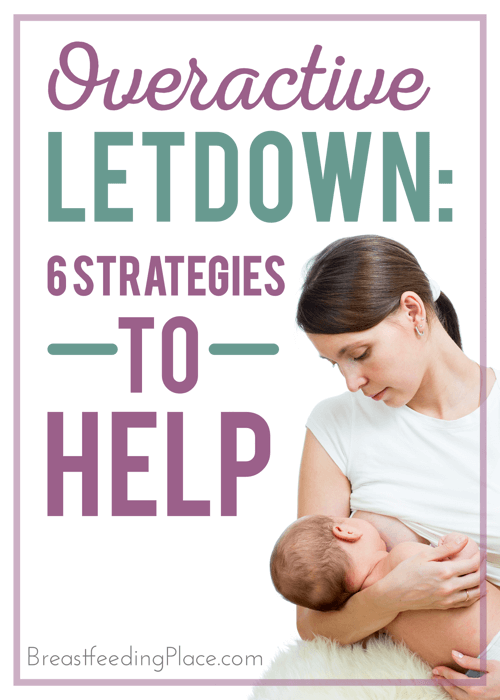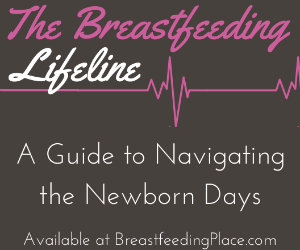In the first few weeks after my son was born (and after I dealt with engorgement from my milk coming in) I started noticing that my baby was coughing and choking every time he started to nurse, and he would frequently unlatch and fuss before resuming nursing. For a while I didn’t know what the problem was, but after doing a little reading I realized we were dealing with overactive letdown. It took some time, and trial-and-error, but the two of us together have learned how to manage it and he nurses just fine now.

If you’ve noticed that your baby gets frustrated when he or she starts to nurse, if they unlatch and your milk comes shooting out, if baby is choking or sputtering or has to pause in nursing to catch their breath, you are very possibly experiencing overactive letdown. It can be very frustrating but it’s also manageable, and you don’t have to give up nursing! Keep reading to learn how to nurse successfully even with overactive letdown.
Overactive Letdown: 6 Ideas to Help Mama and Baby
Slow down the milk flow manually.
Pinch your nipple by grasping the areola as soon as you feel letdown beginning. This will slow down the flow. Often it’s enough to let baby catch up and keep eating without getting too much milk at once.
Try a new nursing position.
Any arrangement that allows your baby’s mouth and throat to be above your nipple should help (thus forcing the milk to work against gravity). Try nursing in a reclined position with baby lying on your chest, face-down. This position often helps with latch issues too. Or you can sit baby in your lap facing you. Then pull them to your breast so they’re nursing sitting up. Depending on your height and your baby’s size, you can also try a modified cradle hold, with baby sitting on your lap instead of lying down in your arms. Nursing lying down can also be effective. It allows baby to drip excess milk out the side of their mouth (tuck a clean burp cloth under baby’s mouth to catch the drips).
Unlatch baby as soon as you feel the letdown.
This is a tingling sensation in your breast; it can almost be painful if your milk comes really fast. Catch the spray in a cloth or towel. Once the milk isn’t coming out forcefully, allow baby to latch on again and continue eating.
Try to only nurse when baby is calm and relaxed.
Nurse just before or just after sleeping are great times. A calmer baby will suck less forcefully, which will trigger a less powerful letdown. Offering the breast before baby starts fussing helps, too.
Offer only one breast each feeding.
Your body will learn to make enough milk to compensate. This will ensure that baby gets plenty of the richer, more filling (although no more or less nutritious) hindmilk at each feeding. Plus, you’ll only have to deal with letdown from one breast, not two.
Try block feeding.
For moms with extremely overactive letdown, this can be helpful. Offer just one breast in a 3-4 hour time frame. Then switch to the other breast for the next few hours. Do this no matter how often baby wants to eat. Again, your body will eventually regulate milk production in each breast to compensate for this routine. In the meantime, if the fuller breast is very uncomfortable, hand-express a little, use cold compresses, or pump for a short time just to relieve discomfort.
As frustrating as overactive letdown can be, it definitely doesn’t need to mean the end of breastfeeding. If you’re not able to fix the problem on your own, don’t hesitate to contact a lactation consultant. It’s their job to help nursing mamas who are struggling! You got this, mama. Good luck! (And comment if you have any questions; we will answer them if we can!)
Have you ever dealt with overactive letdown? What strategies were most helpful for you?







Speak Your Mind